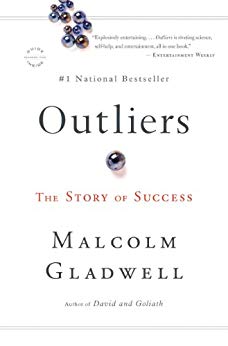

This article is an excerpt from the Shortform summary of "Outliers" by Malcolm Gladwell. Shortform has the world's best summaries of books you should be reading.
Like this article? Sign up for a free trial here .
Are you looking for discussion questions about Outliers? How can you apply Malcolm Gladwell’s lessons to your own life?
In Outliers, Gladwell argues that the self-made man is a myth. Instead, he says success depends just as much on factors that lie beyond the individual and the individual’s control, including where and when they were born and what kind of family they were born into.
Here are some Outliers discussion questions to consider.
Discussion Questions Inspired by Outliers
We love tales of geniuses and underdogs who rise to success through extraordinary talent and hard work—but this isn’t the whole story. In Outliers, Malcolm Gladwell argues that these stories of supposedly self-made men and women mislead us into thinking that success is an individual achievement. But in reality, every successful person had circumstances that contributed to their success.
Here are some Outliers discussion questions to help you on your way to success.
Acknowledge Early Opportunities in Your Life
Think about the role of accumulative advantage and self-fulfilling prophecy in your own life.
- Describe one opportunity or disadvantage that you had early in your life or career. For instance, maybe you had a particularly supportive coach, or you had to cope with instability in your home life.
- Describe one thing that happened as a result of that opportunity or disadvantage.
- Describe one thing that that thing led to.
- How else could you have reached the last point above, if not through the initial opportunity or disadvantage and subsequent event?
Clock Your 10,000 Hours
How can you achieve your 10,000 hours for mastery?
- Think of a skill or craft that you wish to master. How much time would you estimate you’ve already spent deliberately practicing that skill?
- Subtract the number of hours you’ve dedicated to deliberate practice from 10,000. (Although 10,000 hours isn’t an exact number for mastery, this will give you a baseline goal.) How long do you think it will realistically take to accrue that many hours of additional practice?
- Identify one or two of the biggest obstacles that lie in the way of achieving your 10,000 hours of deliberate practice. How might you reduce these barriers?
- Since deliberate practice is goal-oriented, write one goal or benchmark you can start working toward now.
Take the Divergence Test
Are you a divergent or convergent thinker?
- Set a timer for two minutes. Answer the question: How many uses can you think of for a box?
- Review your answers. Would you describe your responses as more characteristic of convergent thinking (conventional uses like “storing objects”), or divergent thinking (out-of-the-box ideas like “as a sled”)?
- With this in mind, set a timer for two more minutes and write down as many additional uses as you can think of. Push yourself to be even more creative in your answers.
- Describe a current project at work or problem in your life that more divergent thinking could help you address.
Hone Your Practical Intelligence
Reflect on your upbringing and strategize to fill in any gaps in practical intelligence.
- Describe at least one instance in your childhood in which your parents demonstrated that you should either challenge or comply with authority.
- Describe how your parents responded to your interests and talents. For example, did they provide you opportunities to invest more deeply in these interests, or did they let you pursue them on your own?
- Describe the nature of parent-child communication in your household growing up. Did your parents solicit your opinions and invite you to debate and negotiate, or did they expect you to comply without questioning them?
- Consider the descriptions of concerted cultivation (which produces children who feel entitled to pursue what they want) and accomplishment of natural growth (which rears children who are less likely to challenge authority and self-advocate). Which best describes your upbringing? How has this impacted your trajectory as an adult?
Find Opportunities in Challenges
Reflect on the advantages you’ve gained from your disadvantages.
- Describe a difficult challenge you’ve faced in your life.
- What is one way you gained an unexpected advantage from that hurdle?
- Describe a difficult situation you’re facing now.
- What is one advantage or opportunity that could result from the situation?
Identify Cultural Legacies
Reflect on the lessons, beliefs, and assumptions passed down to you.
- Think of lessons your parents explicitly taught you growing up, or values or beliefs you learned from your parents’ or other relatives’ example. What are they?
- How have these lessons or beliefs contributed to your success?
- How might they have hindered your success?
- Knowing this, how can you overcome or capitalize on your cultural legacy?
What Is Success?
Gladwell’s examination of the formula for success challenges common beliefs.
- In what ways has your idea of success changed after reading this book?
- To what factors do you attribute your own success?
- What were some of the most surprising things you learned from the book?
———End of Preview———

Like what you just read? Read the rest of the world's best summary of "Outliers" at Shortform . Learn the book's critical concepts in 20 minutes or less .
Here's what you'll find in our full Outliers summary :
- What makes some people outliers, and most others not
- Why some genius outliers end up failing in life
- Why Asians are good at math, and other curiosities of culture






